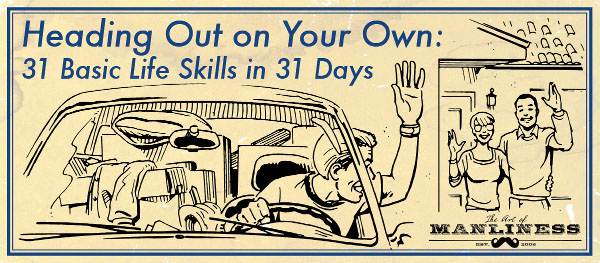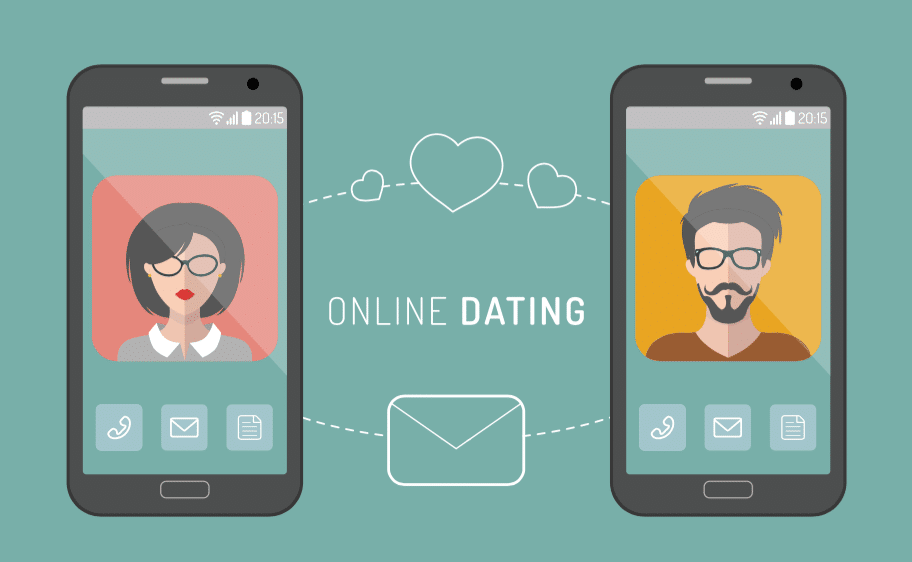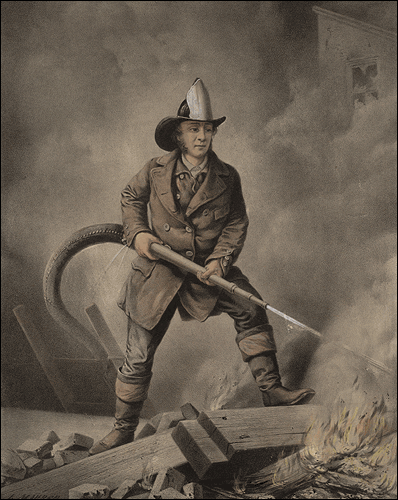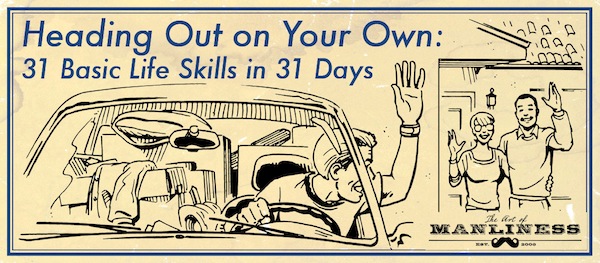
This article series is now available as a professionally formatted, distraction free paperback or ebook to read offline at your leisure.
All the basic life skills we’ve covered so far in this series have been things that your dad, and even your granddad, had to learn when he left home for the first time too.
But today’s young man faces a new challenge that Pops never encountered: managing his online reputation.
Despite the nascent nature of this skill, I truly believe it’s one of the most important things we’ll talk about in this series. As the line between the offline and online world gets increasingly blurry, your online reputation is your reputation. Before you meet your freshman roommate, before you pick up a date, before you shake the hand of a potential employer…you better believe they’ve already Googled you, already formed a first, first impression about you, your interests, and what kind of person you are. Thus, if you’re not careful and conscious about the content you create online, you can end up shooting yourself in the foot in all areas of your life.
Heading Out on Your Own…And Into a Fishbowl World
Leaving for college or another kind of adventure after high school has long been an exciting and heady time. It’s an age where you’re experimenting with ideas and values, testing new freedoms, meeting new people, and often changing your mind about who you are and what you want out of life. One week you feel one way, and the next you feel another. During this process you often make mistakes, and do bone-headed things that twenty years later will still make you wonder, “What was I thinking?”
Just a decade ago, only you, and a few of your closest friends, would have held the memory of those crazy and sometimes cringe-worthy moments. The only record of them could be found by digging up a private photo album or journal.
Today…it’s a whole new ball game.
Now, everything you do and say can potentially become part of your permanent and public record. Everybody’s got a smartphone and can snap a picture of you anywhere, anytime and post it online. And things that go up online about you and from you can remain there forever. Mistakes you made when you were just 19 can haunt you for the rest of your life. Being a young man used to mean you could entirely reinvent yourself by moving to a new place and making new friends, but now your online reputation will follow you wherever you go.
I don’t mean to sound all doom and gloom about it. But that’s the sobering reality of living in the Internet Age, and it doesn’t help to bury one’s head in the sand and try to whatever that reality away. It absolutely doesn’t mean that college can’t still be the fun, spontaneous experience it’s always been; it just means you need to take a conscious, proactive approach to taking responsibility for what parts of that experience end up online and in the public eye.
Why Is Proactively Managing Your Online Reputation So Important?
One of the greatest things about the internet is that it is a giant pot that people can both add to and take from. This puts the most enormous wealth of knowledge in human history right at our fingertips and provides an endless amount of inspiration that can be added onto and “remixed.”
The downside of the big internet pot, is that the moment you put something into the pot, you pretty much lose all control over it. Many viral embarrassments have started out as something someone just wanted to share with a few good friends. But those friends shared it with their friends, who shared it with their friends…on and on until it ended up on Tosh.O.
There are essentially no guaranteed take backs when it comes to what you put online. You can erase your Facebook status, blog post, comment, tweet, or video, but someone else may very well have already shared it, copied it, taken a screenshot of it, or downloaded the video and reposted it somewhere else. How websites looked on a certain date in time are captured and archived on sites like the WayBack Machine (take a look at AoM circa 2008!). Emails that you thought you deleted forever can still sometimes be retrieved, and just because you deleted an email doesn’t mean the person you sent it to didn’t archive it. If someone else wants to post something of yours, you may not be able to get them to take it down without suing.
All of which is to say, pretty every piece of digital content you create can potentially exist forever. And this digital record can be accessed by any of the 250 million internet users in the US, not to mention the 2 billion online all over the world.
What’s on that record can have a big impact on both your personal and professional life.
Your college’s admissions office may have Googled you when they looked over your application. As soon as your freshman roommate knew you’d be bunking with him, he Googled you. When you network with someone at a party and tell them about your great idea, they’ll Google you later. And 81% of singles say they Google or check the Facebook page of someone before meeting him or her for a date.
Even though only 7% of Americans think their online reputation influences hiring decisions, in reality, 75% of US companies have made an online screening a formal part of the hiring process, 85% of recruiters and HR professionals say that having a positive online reputation influences their hiring decisions, and 70% of recruiters say they have rejected candidates based on something they found about them online. And since those numbers come from a study done in 2009, they’re undoubtedly even higher now.
What kinds of online discoveries cause recruiters and HR personnel to push your resume to the trash? This chart shows the most common red flags employers look for:

As you can see, it’s not just content you create that employers are checking out, it’s stuff your friends and colleagues post too. Be careful who you associate with.
Some young folks may be tempted to respond by saying, “Well, if a company is going to reject me for posting pictures of my drunken revelry, I wouldn’t want to work for them anyway.” But that’s pretty short-sighted. I’d venture to say that these companies aren’t rejecting candidates so much because they like to drink or swear, but rather that their willingness to show off these behaviors publicly shows a lack of judgment and wisdom. Not at all an unreasonable assumption.
The information that new friends and potential employers can find about you online may not even be true. Some people will try to verify it, some will not. And what they see will often come without any context – maybe you were being funny, maybe it’s an inside joke, but they won’t know that, they’ll simply make immediate judgments about what they find. This is why when it comes to managing your online reputation, you must be both proactive and defensive — deleting anything inappropriate, wisely choosing the digital content you create, and purposefully creating positive content about yourself.
Self-Reflect Before You Self-Reveal
“Young people in particular often self-reveal before they self-reflect. There is no eraser button today for youthful indiscretion.” –James Steyer
There are some practical ways to manage your online reputation, and we’ll get to them in a moment. But the first step in taking responsibility for your online presence is creating a mindset for how you want to approach your online life.
Matt Ivester, the author of lol..OMG! (despite the silly-sounding title, this is actually a great book, with solid advice from the guy who learned about online reputation management firsthand from his misadventures in founding Juicycampus.com), suggests three questions to ask yourself before you put something online:
1. Why are you doing this?
Why? This is the most important question of all, and one that unfortunately usually goes unasked and uncontemplated.
Today’s colleges are welcoming the first “digital natives:” they’ve never known a time when the internet wasn’t a huge part of their lives. And even for those who are old enough to have used encyclopedias for elementary-school research papers, interacting and participating online has become so ubiquitous that it’s hard to imagine that life was ever any other way. This is just how things are, and we do what everyone else is doing, so much so that we hardly ever ask why we are doing those things. Once we do start asking why, the answers are surprisingly hard to come up with and articulate.
Why do you update your status or share a link on Facebook? Do you want to share news? Are you bored? Do you want to be thought clever? Are you trying to make someone else jealous? Do you want to see if people feel the same way as you? Why?
Why do you care how many likes or upvotes something you submit on Facebook or Reddit gets? Is it confirmation that you shared something with value? Why?
Why do you leave comments on blog posts? Do you want the author of the blog to know that you appreciated the article? Do you think you have the insight to add that might help another reader? Do you want the author to know how and why they are wrong? Why? What do you hope to accomplish? Do you think it will change their mind? Is it because the psychological angst you feel when you think someone is wrong needs to be discharged? Why?
Why do you participate in online forums? Does it provide a feeling of camaraderie? Do you like to hear others’ opinions? Why do you respond when you think those opinions are wrong? Why do you care what a stranger thinks about you? Why?
When you ponder the why behind creating any kind of online content, from a status update to a YouTube video, you may come up with a reason that you find satisfactory and worthwhile. Or you may find that your motivation is hard to make sense of and decide it’s not worth your time. Either way, by asking why, you’ll become what Ivester calls “a conscious creator of content.”
2. Is now the right time?
The internet creates a perfect storm for impulse control: at the same time that it actively solicits impulsive communication and make satisfying those impulses incredibly easy, it makes taking back the results of those impulses incredibly difficult; it’s easy to hit “send” or “submit,” and quite hard to un-send and un-submit something.
Facebook asks, “What’s on your mind?” while Twitter wants to know “What’s happening?” They owe their existence to people’s desire to share their thoughts, videos, and photographs – and they need to be constantly fed to survive and grow and make money. And blogs (including ours) want to engage readers and build community and so ask for comments. The internet is set up to encourage you to share whatever thought crosses your mind, and taking that thought from your cranium to the walls and screens of the digital world only takes a few clicks.
But just because you can share your thoughts on impulse doesn’t mean you should. Not only because you probably haven’t thought through the why behind wanting to share first, but because strong impulses are usually born from strong emotions: anger, depression, and grief, or from chemically-altered states (like being drunk). When you spout off and share personal feelings while emotional or trashed, you will likely come to regret it once those strong emotions fade or you sober up.
The best thing to do when you feel you’re dealing with an impulse to put something online that you might regret later, is just to sit on it. The internet creates a false sense of immediacy, giving you an overwhelming feeling that you have to respond now. But what you’ll find is that something that felt super urgent and mega important to say in the moment, will seem totally pointless when you wake up the next morning.
One method I use to thwart impulsive responses is to imagine myself living before the internet. If I feel a burning urge to tell the author of an article what a chucklehead he is, I think of reading a magazine in the 80s, and how I would have had no outlet to express my opinion about it besides writing up a letter to the editor or talking to my wife or close friends about it. Or if something annoys me and I want to rant about it on Facebook, I think of a time before Facebook when I would have had no choice but to keep my rant to myself. It makes me realize that just as sharing whatever crosses your mind wasn’t necessary then, it’s not necessary now. The fine-folks of the 80s, while they made some questionable fashion-choices, weren’t any less happy than we are now that we’re able to shout what we’re feeling and thinking to everyone 24/7.
3. How controversial do you want to be?
The younger generation (including those my age) was raised with a lot of rhetoric about how special and unique they are, how important it is to be “authentic,” and that it’s good to be “transparent.” This can lead folks to throw caution to wind about what they share online because, “I’m just trying to be me! And if other people don’t like it, they can bite me!”
But just because you can now display your opinions and personality to a greater number of people than ever before, doesn’t mean you should, or that the more you share, the more authentic you are. Going back to my suggestion of thinking about life before the internet, people used to only be able to share their quirks with a close circle of family and friends, and they weren’t any less themselves than we are (actually they were probably more themselves since they didn’t get instant feedback on all of their quirks).
Examining the meaning of authenticity isn’t within the purview of this post (although it will be a future series), but suffice it to say for now that the ideal for many of the great men of the past was not transparency, but sprezzatura – only revealing themselves to others slowly as a relationship of trust developed. You may want to “be yourself” by trumpeting your religious, social, and political beliefs online every chance you get, but if those meme’s you keep flooding Facebook with is the only thing new acquaintances know about you, they may decide they don’t want to get to know you before they even do — they’ll miss the complexity of your character that would have shown through over time…that you’re both a liberal and a rabid gun owner, or a fervent Christian and a scientist, or a zealous vegetarian and a Marine.
The three questions above can go a long way to helping you judiciously choose what and what not to post online. A final question to consider is what the general public might think of the content if for some reason what you post went viral or you were suddenly thrust into national prominence. Would it embarrass your family? What impression would a stranger have of it? You and your friends might think it’s funny, but would others find it offensive? You never know who’s going to see your post, what’s going to be dug up on you later, and who might be looking at your phone.
How to Manage Your Online Reputation
Managing your online reputation involves both deleting content you don’t want out there and creating content you do. Follow the steps below that Ivester and others have suggested, and complete each step right after you read it. This is the kind of thing that’s easy to put off indefinitely. Do it now.
1. Google yourself.
Before you can know what actions to take to manage your online reputation, you need to know what’s already out there. To do this, first deactivate Google’s customized search – when you typically do a Google search, the results Google brings up are based on things like your location, what you’ve clicked on before, and things your friends like. But you want to see what would come up if someone else searched for you. Here’s how to take off the customized search feature.
If you have a common name like “Rob Smith,” then search for your name with a qualifier like, “Rob Smith St. Louis,” or “Rob Smith Tulane University.”
After you look at Google’s results for you, check out other search engines like Bing and Yahoo as well.
When you look at the results that come up for your name, try to imagine what conclusions someone might reach about you if they had no other context for that content, and knew nothing else about you.
2. Try to remove content that you don’t want showing up in search results anymore.
After you do a search for yourself, it’s time to try to delete things that showed up that you’d rather not have out there anymore. Maybe you signed up for an internet forum with your real name. Maybe you left a comment on a blog post under your real name. Maybe you wrote a review or a blog post that you now feel is too controversial. Some of these things you can delete yourself.
If you can’t delete something yourself, like a blog post comment on another person’s blog, then try to contact the owner of the site to see if they will remove it for you. They may or may not, but the nicer you are about it, the greater the chance of them helping you, so make your request as civil and appreciative as possible.
If you can’t find the contact information for the site owner, try the site WHOis. Website registrars are required to publish the contact information for the person who registered the domain. Oftentimes when you look up a site on WHOis, you’ll find that the owner has decided to keep their direct contact information private and have instead given a proxy email address. Either way, your email will end up in the same place.
Understand that even if you’re successful at removing the offending content from a site, it may take a few days or even weeks before it’s reflected in search engine results. Also, understand that the offending item really hasn’t “gone away.” There’s a chance that it has been archived on the WayBack Machine. Remember, what’s put on the internet stays on the internet forever.
Moving forward, be extremely judicious when using your real name online.
3. Proactively create a positive first impression online.
Your best bet in managing your online reputation is proactively creating positive content about yourself that pushes the bad stuff off of the first few pages of search engines. Set up accounts with large social networking sites that typically rank high on Google and other search engines. Twitter, LinkedIn, Facebook, and Google+ profiles are often on the first page when you look up someone’s name. Set up accounts with them and post stuff that you’d be proud to have your name associated with.
The best thing you can do to ensure positive stuff associated with your name is at the top of search results is to start a blog and update it regularly. If you can, try to secure a domain name with your given name for your blog. What should you write about on your blog? You can publish your resume (redacting phone numbers and addresses, of course), write posts sharing insights in an expertise you might have, or use it to create a portfolio of your work if you’re a freelancer. Whatever it is, make sure it’s stuff you want associated with your name.
Cross-link your blog and all your social networking profiles together: put your link to Facebook and Twitter on your blog, a link to your LinkedIn profile and blog on your Facebook account, and so on.
Even if you don’t plan on using Twitter or Google+ or even putting anything on your blog, it doesn’t hurt to have your name registered with those accounts and domain. You don’t want some Joe Schmo mucking up your good name with a bunch of crazy online antics.
4. Adjust privacy settings on Facebook and clean up your Facebook Profile.
To ensure that potential employers or love interests only see the best of you when they look you up on Facebook, make the following adjustments:

First, take a look at how your profile page looks to the public. If you see any information visible that you don’t want strangers to see, make a note of it.

To change what’s visible on your profile page, click “About.”

Click “Edit” on the next page. On each segment select “Friends” if you don’t want anybody who’s not your FB friend to see a particular piece of information. For networking reasons, I’ve left my job and school information visible to the public.

Visit the Facebook Privacy Settings page and adjust all your privacy settings so only your friends can see photos and status updates you make.
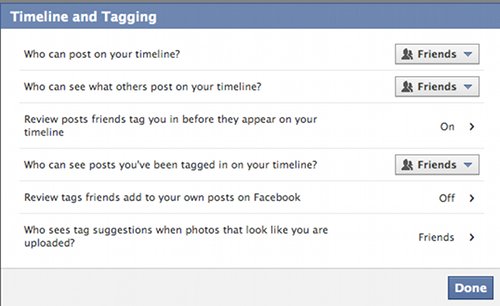
On the privacy settings page, update what your friends can share about you under “Timeline and Tagging.” Enable the ability to review and approve posts or photos that you are tagged in before they’re published on your Timeline. You can also disable Facebook’s tag suggestion when your friends upload photos that look like you. You don’t want your name tagged in an unflattering photo or post.

While you’re on the privacy settings page, limit who can see posts from the past. Even if you used to post everything publicly, this will retroactively make those posts private.
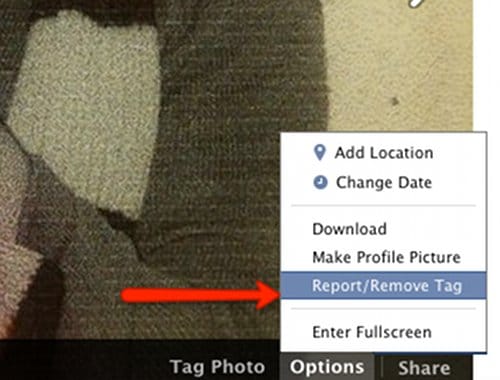
Review the photos that you’re tagged in and untag yourself from any unflattering photos. While you’re at it, you might ask your friend to remove the photo if it’s something you don’t want out there. Even if you’re not tagged in the pic, it could come back to haunt you.

Leave groups and unlike pages that may be seen as controversial…or just dumb. At least set the privacy settings on them so only your FB friends can see the pages you like. how.
5. Be more conscious of what you share and whom you share it with on Facebook.
Ask the three questions we covered above before posting something on Facebook. That will save you a lot of grief.
Also, take into account if what you’re about to share is appropriate and relevant to ALL your Facebook friends. You don’t need to share your weekend plans with your old boss and former professors. In real life, you adjust what you talk about depending on your company — do the same on Facebook. Create lists on Facebook for close family/friends, acquaintances, professional colleagues, people that are the same religion as you, people you enjoy talking politics with, etc. Before posting something, ask yourself if this is something all your friends would be interested in or is better for a specific list of your friends. And even if you’re only posting for a list of close friends, still keep in mind what others would think if that status or photo got shared with people outside the list. It could happen.
6. Create strong passwords for your accounts.
If the recent story of tech writer Mat Honan’s online life being completely demolished by hackers doesn’t motivate you to strengthen your online security, then I don’t know what will. Create strong passwords for all your accounts and change them every six months. A strong password is at least 8 characters long and includes at least one special character (&!#) and both upper and lower case letters. Your passwords shouldn’t be the same for all your accounts. To manage all your passwords, use an app like LastPass.
To reduce the chance of getting hacked, enable two step authentication. Here’s how to do it on Google (if you use Gmail) and Facebook.
7. Use passwords on your laptop and mobile devices.
An unattended laptop or mobile device provides a devilish opportunity for friends or random strangers to mess with your online life. I know several people who had to do a lot of scrambling to recover from an offensive tweet sent from an unattended iPhone by a mischievous friend. Avoid that. Enable password protection on all your mobile devices.
8. Set up a Google Alert for your name.
Keep your finger on the pulse of what’s said about you on the web by setting up a Google Alert for yor name. Just enter your name as a search query and Google Alert will email you a digest once a week (or daily if you want) of all the new content that’s hit the web with your name in it.
Conclusion
The internet is an amazing educational, social, and networking tool — you just need to use it wisely. Using it too little can be just as damaging to your personal and professional life as using it too much. Be a “conscious content creator” and use sound wisdom and judgement in deciding where you personally want to draw the line between your public and private life.
Any other tips on managing your online reputation? Share them with us in the comments (only after asking yourself why you’re commenting and making sure it’s the right time, of course)!


